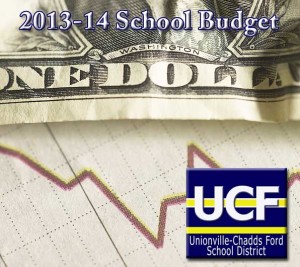Some question remains as to whether board will cut spending to save for future pension costs
By Mike McGann, Editor, The Times
 EAST MARLBOROUGH — When the Unionville-Chadds Ford Board of Education considers adopting a preliminary final budget Monday night, it appears only two scenarios, or a variation, will be on the table.
EAST MARLBOROUGH — When the Unionville-Chadds Ford Board of Education considers adopting a preliminary final budget Monday night, it appears only two scenarios, or a variation, will be on the table.
During last Monday night’s budget hearing, the schools administration offered up a pair of plans, one calling for modest program improvements, after three straight years of either cuts or status quo budgets — and a tax increase balanced across Chester and Delaware counties at 2.01%. That budget calls for $72.66 million in spending and $72.39 million in revenue, roughly $56 million from local taxes.
The tax rate would hike annual taxes on the average home in the district in Chester County by $149.37 and by $69.69 for the average home in Delaware County.
A second proposal, which would require cuts of some $160,000 from the budget would come in at 1.65%, placing it under state’s Act 1 limits. The higher rate would require using a small amount of the district exception granted earlier this year by the Pennsylvania Department of Education for pension costs.
Even the higher budget number does not take all of the increase available to the district. Were it to apply the entire exception for pension costs to the tax rate, the district could increase taxes by a balanced amount of 3.39% for 2013-14.
Based on a quick survey of board members during the meeting, it appears a majority of the board supports the 2.01% plan — but two variations of that plan could still be in play. A second version would still make the $160,000 in spending cuts, but reduce the $275,000 being taken for this budget from the pension reserve fund. A number of board members said that they wanted to see more specifically what those cuts would mean in terms of the administration.
Superintendent of Schools John Sanville said he would have those specifics for this Monday’s meeting, but suggested it would likely mean more compression of staff — as has occurred in recent years, such as the merging of food services and transportation under one supervisor, or the merger of K-5 and grade 6-12 curriculum supervisor into one position.
Member Keith Knauss said he had “a strong desire to stay within Act 1” and “a visceral dislike” of exceeding the state index. Frank Murphy, slated to resign from the board before it takes its final vote on the budget on June 17, said he’d prefer to stay under the Act 1 limit, but would support the other scenario if it had broad board support, saying he found both proposals to be “palatable.”
Among the other seven board members, all seemed to think that the slightly higher tax rate would serve the short and long-term needs of the district better. With pension costs likely to increase by a similar percentage, but larger dollar amount for the 2014-15 school year, a number of board members argued that there is some advantage to increasing the base number to which next year’s Act 1 limit, expected to be 2.2% without exceptions, to smooth out the rate of increase prevent cuts to personnel and program four to five years down the road.
The big question Monday night would appear to be whether or not to bank money for further anticipated PSERS increases, expected to top out at more than 30% of payroll — or double the more than $6 million currently paid out, by the 2018-19 school year. With bond re-financing savings and some additional savings of funds for a rainy day, the district set aside some $2.2 million in PSERS reserve funds, intended to ease the jolt to taxpayers from yearly increases. A number of members, Holly Manzone among others, objected to the idea of serving as banker for the district, instead of using the reserve as intended, now midway through what is expected to be the worst of the rate hikes.
A number of board members expressed concerns about the impact of further compression, as staffing levels have dropped since the 2008-09 school year. That year saw a total 334.4 teaching positions, 328 support positions and 24 administrators budgeted. In contrast, the proposed 2013-14 budget has 324.4 teaching positions budgeted, 313 support positions and 19 administrators.
As has been the case in recent years, declines in transfer tax — taxes from home sales — reduced tax assessment (only Pocopson and Newlin did not see a net reduction in property values) and pension costs continue to put the squeeze on the district. But the biggest hit remains the Pennsylvania School Employees Retirement System (PSERS), which is expected to require an additional 16.93% of full-time salaries be put into the system, up from 12.36% last year. The state reimburses districts for 50% of that cost, but the impact on the Unionville district still looms large. The figure increases nearly $2 million for the 2013-14 budget.
A bill introduced in the state legislature this week could reduce those numbers, but its fate — and whether it can pass both house before June 30 is very much in question.






